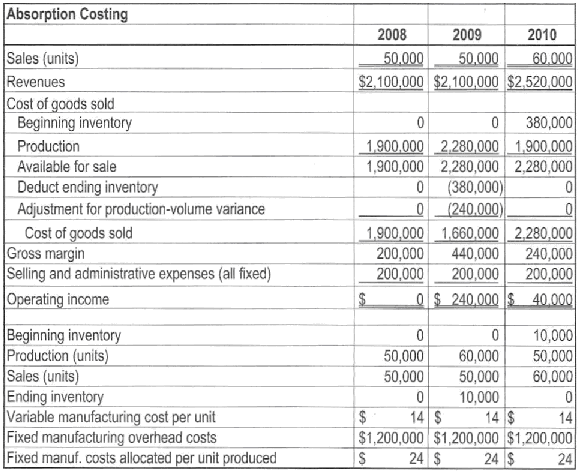Question: Variable and absorption costing, sales, and operating-income changes. Headsmart, a three-year- old company, has been producing and selling a single type of bicycle helmet. Headsmart
Variable and absorption costing, sales, and operating-income changes. Headsmart, a three-year- old company, has been producing and selling a single type of bicycle helmet. Headsmart uses standard costing. After reviewing the income statements for the first three years, Stuart Weil, president of Headsmart, commented, “I was told by our accountants—and in fact, I have memorized—that our breakeven volume is 50,000 units. I was happy that we reached that sales goal in each of our first two years. But, here’s the strange thing: in our first year, we sold 50,000 units and indeed we broke even. Then, in our second year we sold the same volume and had a positive operating income. I didn’t complain, of course, but here’s the bad part. In our third year, we sold 20% more helmets, but our operating income fell by more than 80% relative to the second year! We didn’t change our selling price or cost structure over the past three years and have no price, efficiency, or spending variances . . . so what’s going on?!”

1. What denominator level is Headsmart using to allocate fixed manufacturing costs to the bicycle helmets? How is Headsmart disposing of any favorable or unfavorable production-volume variance at the end of the year? Explain your answer briefly.
2. How did Headsmart’s accountants arrive at the breakeven volume of 50,000 units?
3. Prepare a variable costing—based income statement for each year. Explain the variation in variable costing operating income for each year based on contribution margin per unit and sales volume.
4. Reconcile the operating incomes under variable costing and absorption costing for each year, and use this information to explain to Stuart Weil the positive operating income in 2009 and the drop in operating income in 2010.
Absorption Costing 2008 2009 2010 Sales (units) Revenues Cost of goods sold Beginning inventory 60.000 50,000 50,000 $2,100,000 $2,100,000 $2.520,000 380,000 1,900,000 2,280,000 1,900,000 1,900,000 2,280,000 2,280,000 (380,000) 0 (240.000) 1,900,000 1.660,000 2,280,000 440,000 Production Available for sale Deduct ending inventory Adjustment for production-volume variance Cost of goods sold Gross margin Selling and administrative expenses (all fixed) Operating income 240,000 200,000 200,000 200,000 200,000 O$ 240,000 $ 40.000 Beginning inventory Production (units) Sales (units) Ending inventory Variable manufacturing cost per unit Fixed manufacturing overhead costs Fixed manuf. costs allocated per unit produced 10,000 50,000 60,000 60,000 50,000 50,000 50,000 10,000 14 $ $1,200,000 $1,200,000 $1,200,000 24 $ 14 $ $4 14 24 $ 24 %24
Step by Step Solution
3.33 Rating (192 Votes )
There are 3 Steps involved in it
Variable and absorption costing sales and operatingincome changes 1 Headsmarts annual fixed manufacturing costs are 1200000 It allocates 24 of fixed manufacturing costs to each unit produced Therefore ... View full answer

Get step-by-step solutions from verified subject matter experts
Document Format (1 attachment)
24-B-C-A-C-P-A (199).docx
120 KBs Word File


